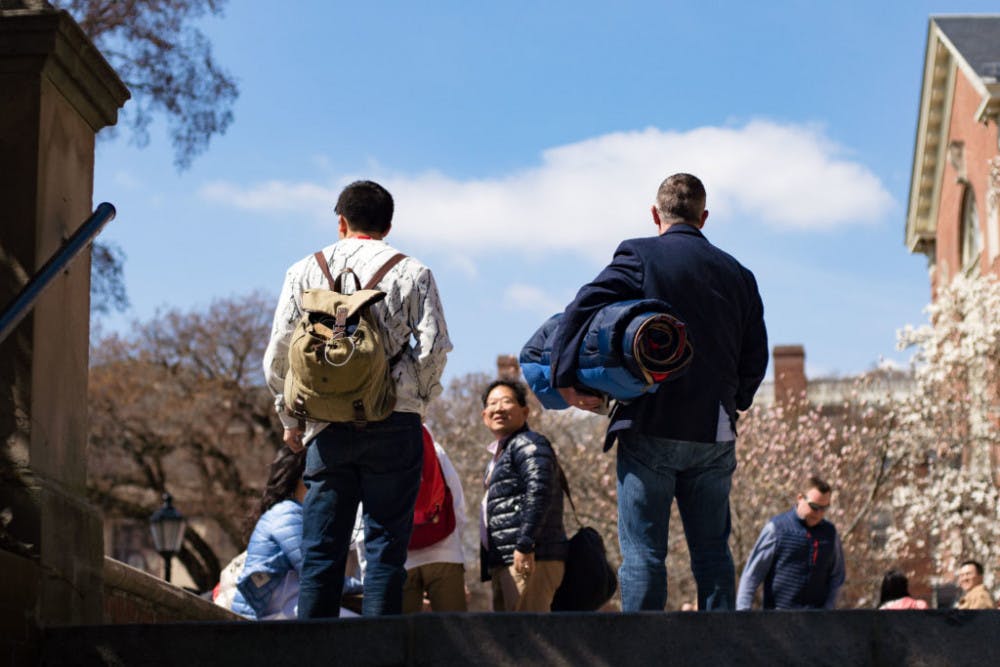The University has canceled A Day on College Hill in response to concerns regarding the spread of COVID-19 coronavirus, Dean of Admission Logan Powell wrote in an email to recently admitted students.
Powell said that the University made the decision out of concern for both current students already on campus and those admitted who would be visiting.
“It became clear to us that we needed to act out of an abundance of caution,” Powell said. “If we were going to put (admitted students) at any risk by way of having to get on a plane, train, travel — we didn’t want them to take that risk.”
The decision came from Brown’s Core Crisis Team, Powell noted, which included himself, University experts on public health and numerous other members of the administration including Chair of the Core Crisis Team and Executive Vice President for Planning and Policy Russell Carey ’91 MA’06.
ADOCH’s cancellation mirrors the decision of a number of other schools: Harvard, Yale, Columbia, Princeton, Stanford University, Penn, California Institute of Technology and Massachusetts Institute of Technology, among others, have all also canceled their programs for admitted students, Powell said.
“We’re going to be on a level playing field with our peer institutions,” Powell said in regards to the potential negative effects on the number of students that accept an offer of admission from the University.
ADOCH brought over 1,200 admitted students to campus last year in three separate sessions, The Herald previously reported. The University had previously scheduled this year’s installation of ADOCH to take place from April 19 to April 20, and had additionally scheduled two day-long sessions to take place on April 17 and April 22.
While Powell noted that most years, ADOCH has often had to accommodate unexpected weather-related issues around the country, the University would “have to go pretty far back in the archives” to find the last time some form of an admitted students event did not occur.
Colby Johnson ’24, who was admitted early decision and had registered for ADOCH in January, said he had planned to make the drive to Providence from Charleston, West Virginia with his parents before receiving word of the cancellation.
“I can understand their point of view from a health perspective,” Johnson said. “There’s only so many precautions they could have taken, and this was a drastic measure. Sometimes that’s the best case just to prevent it — who knows where (COVID-19) will be in a month from now.”
But he also noted he was disappointed about the decision at a personal level. Johnson had already talked to future classmates online whom he had planned to meet in person and was looking forward to getting to know campus.
Caroline Kaleel ’24, also admitted early decision, had planned to fly with her parents from Los Angeles for ADOCH, spending the night on campus with a friend who is currently a first-year. The cancellation “makes sense,” she said. “Do I want to put myself and others at risk by potentially contracting a disease?”
“I had kind of been expecting it,” Kaleel said, adding that even before ADOCH’s cancellation, she had other events canceled due to concerns about coronavirus. Still, Kaleel said she was looking forward to experiencing life on campus, and commiserated with her family after the University informed her that the event had been canceled.
“We got ice cream for dinner,” she said. “It’s kind of sad-sounding — it’s because other stuff got canceled, too.”
Admitted students “are absolutely understanding,” Powell said. “This is not a Brown-isolated issue. … They get it. We’re still excited about seeing them in the fall.”
According to an email sent to already admitted students who registered for ADOCH, the University will offer “several virtual opportunities” throughout April to provide more information about the University from current students and faculty.
Kaleel said she wasn’t sure if she would participate in the virtual events, depending on what they turned out to include. According to Powell, the University — which is still in the process of admitting students regular decision — is working rapidly to develop remote programming.
“It’s forcing us to be more virtually creative than we’ve needed to be before,” Powell said, noting that the University often tells prospective students that the best thing they can do before deciding to enroll is to visit campus.
“It’s an opportunity to come together and perform outreach that we haven’t done before,” he said. “It’s not an opportunity we wanted, but one we hope to make the most of.”

Will Kubzansky was the 133rd editor-in-chief and president of the Brown Daily Herald. Previously, he served as a University News editor overseeing the admission & financial aid and staff & student labor beats. In his free time, he plays the guitar and soccer — both poorly.





